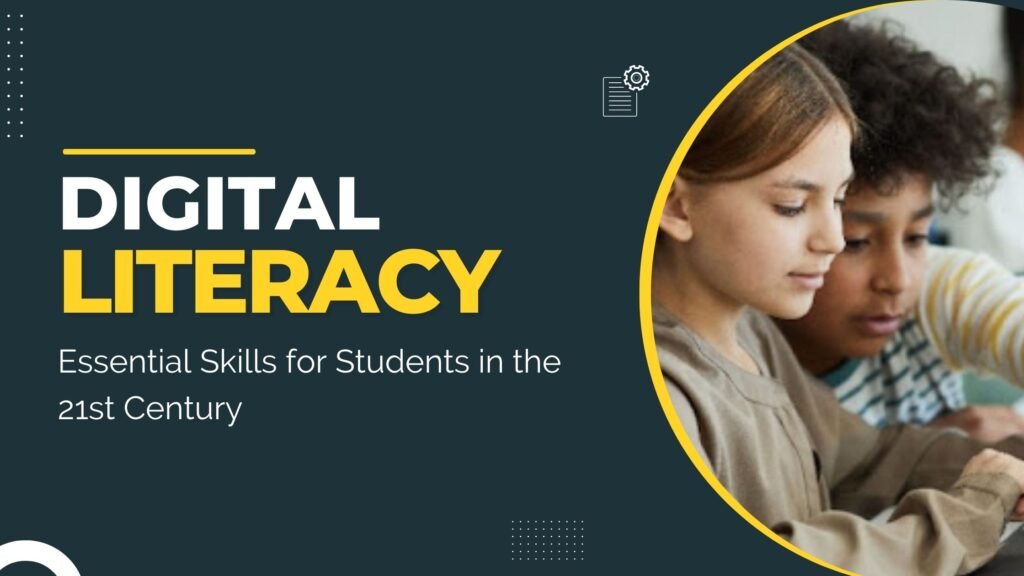Introduction:
Digital literacy is the ability of a person to understand the available technologies and use them in suitable situations to solve a problem or to make their day-to-day life easy. When it comes to students it is nowadays mandatory to have at least the basic digital literacy. The majority of students need this skill. On the other hand, some people know about the technology but need to learn how to use it effectively, resulting in misusing these technologies.
Over 60% of jobs in today’s market require digital skills. With technology evolving, the importance of digital literacy in education has been critical. So the question is, what does being digitally literate mean, and how can we help students keep up with this fast-paced world?
What Does It Mean to Be Digitally Literate?
Digital literacy is not just about knowing how to use new technologies. It’s about knowing how to find and evaluate information online, how to communicate effectively through social platforms, and how to stay safe and responsible while using the internet. Also, it’s about knowing how to tell if a website is reliable or not, having a deep understanding of online privacy, and knowing what to share and what to keep private ensuring digital security.
And then there’s ethical behavior, treating others with respect online just as you would face-to-face. We want students to question what they see online, to think before they click, and to always consider the impact of their digital actions. All these skills combined make a digitally literate person, someone who can thrive in today’s tech-driven society.
Who can educate?
That’s all being said with digital literacy, now you can ask how can we make the students digitally literate. One of the effective ways might be to start teaching them from the place where they start their journey of education that is the schools.
Schools can play a huge role here, by offering access to technology during school hours, creating an environment where every student, regardless of background, can develop the digital skills they need. It’s from creating awareness about the emerging trends to giving hands-on training on the technologies, that schools can help students get a good start with their digital journey.
But the catch is that schools can’t do it alone. Teachers themselves need to be equipped with the right skills to guide their students. This means regular training for educators, so they’re up-to-date with the latest technologies and trends.
What to teach them?
Beyond basic computer literacy, today’s students need to familiarize themselves with emerging technologies that are shaping the future. For instance, understanding how artificial intelligence (AI) works, and its potential applications. Then there’s blockchain technology, which, while often associated with cryptocurrencies like Bitcoin, has broader applications.
Cybersecurity is another critical area. With increasing concerns about online privacy and data breaches, students need to know how to protect themselves and their information online. This includes learning about secure passwords, encryption, and safe online practices.
We are not saying that students should learn all advanced concepts in these domains, the motive is that they shouldn’t be unaware of these technologies and their uses and the basic principles behind them.
What is stopping us?
It’s easy to talk about digital literacy, but the reality is that not all students have the same access to technology. For students from the underprivileged part of society, access to even the basic technologies is not an easy thing. Closing this gap isn’t just about providing devices—it’s about making sure all students have the opportunity to learn and grow in a digital world.
Schools can play a huge role here, by offering access to technology during school hours. Additionally, the Government also can help these students by giving subsidies and promoting digital education. It’s about creating an environment where every student, regardless of background, can develop the digital skills they need.
How We Can Help?
So, how do we ensure that every student becomes digitally literate?
The first thing we can do is to integrate digital literacy in every aspect of the curriculum. By weaving digital literacy into all subjects, we make it a natural part of learning, rather than something separate or optional.
It is equally important for parents to have an awareness about digital education so that they can support the students in this process. And let’s not forget about the importance of critical thinking, and ethical and moral values while using technology.
As we look to the future, one thing is clear digital literacy is going to become more important as new technologies emerge. From artificial intelligence to the Internet of Things, the digital world is expanding at a rapid pace. This means that our approach to digital literacy needs to evolve too.
It’s not just about preparing students for the workforce. It’s about equipping them with the skills to navigate and contribute to a digital world.
What’s the takeaway?
By promoting digital literacy, we’re helping students become thoughtful, informed, and responsible digital citizens. In the end, it’s an essential skill set that every student needs. As technology continues to shape our lives, being digitally literate means more than just knowing how to use a device. It means understanding how to use technology in a way that’s smart, safe, and ethical. By prioritizing digital literacy in our education systems, we’re setting students up for success in a world that’s constantly changing.





Leave a Reply